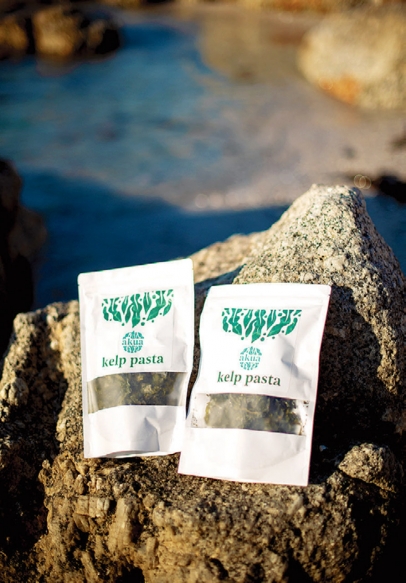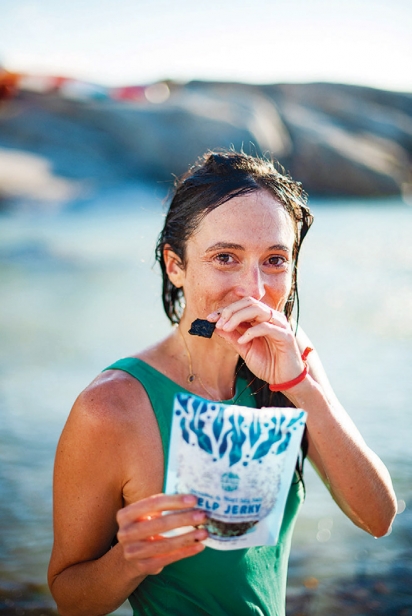AKUA Kelp-Based Products
“I was always that kid growing up on the beach on Cape Cod pulling seaweed out of the water and eating it,” says Courtney Boyd Myers, co-founder of AKUA. “I loved it.” While Myers might still eat kelp fresh from the ocean, she is more likely to enjoy it in one of her year-old company’s kelp-based products, like jerky, cacao-date balls or pasta — strands of kelp that have been dehydrated and cut into noodle shapes. Once cooked, Myers says, it “has the texture of a perfectly cooked algae-dente pasta.”
Myers founded AKUA (a Hawaiian/ Polynesian term for the gods, goddesses and spirits who protect the oceans) with Matthew Lebo on Earth Day in April 2019. “He is as weirdly obsessed with kelp as I am,” she says. Increasingly, they are not alone.
The Cotuit resident, who had a tech marketing career before wading into seaweed, says, “When I turned 33, I started to care so much more about our food systems.” She began to research sustainable agricultural systems and learned about the regenerative agricultural movement. Her best friend from Connecticut, who helped found GreenWave, a Connecticut-based organization that helps start restorative ocean farms and build demand for their crops, invited her to see what they were doing with kelp. Myers began to advise GreenWave and in 2017 helped raise $25,000 through a bike ride from the organization’s New Haven farm to Woods Hole.
Even then the farmers and those supporting them understood that they had to create a demand for the aquatic crop. “So much of this world with kelp is a balance between the romanticism of eating this sustainable food from the ocean and trying to break into the mainstream market and getting people to eat seaweed,” says the former marketing executive. At the time of the fundraiser, she notes, “The plant-based eating scene was skyrocketing. So was the high-protein snack scene, especially around meat proteins.” But there wasn’t a soy-free, vegan, high-protein jerky. Enter kelp.
It took Myers and Lebo a year of experimenting to come up with the recipes for their initial products — Spicy Thai & Spirulina, Rosemary & Maple BBQ and Sesame & Nori Sea Salt Kelp Jerky. Initially they worked with a chef. When that relationship didn’t work out Lebo took over recipe testing and working with the machinery necessary to turn the seagreens into snack food. The partners also tried three manufacturers before they found their current one in Portland, Maine.
AKUA uses kelp that is farmed in Maine, Rhode Island and Chatham (see related article in our Summer 2019 issue). It is blanched, rough-cut and dehydrated before going into the jerky. Each 1.5-ounce bag boasts 10 grams of fiber and 10 grams of protein, along with vitamins A, B1, B2 and E, iodine, iron, magnesium and zinc. Kelp also has digestive enzymes, and AKUA is promoting its newest product (a collaboration with BIOHM, a company that sells digestive supplements), kelp balls with a cacao-date base, as a perfect accompaniment to morning coffee. But you might not want to limit yourself to morning. The company will also introduce two new jerky flavors, Teriyaki and Spicy Chili & Lime (to replace Thai & Spirulina).
AKUA purchased 40,000 pounds of kelp in 2019, selling roughly 1500 bags of jerky per month, and plans to buy 60,000 pounds in 2020. Though its products are sold in some brick-and-mortar locations, most sales are online. Eliminating the middleman, Myers says, improves the company’s cash flow and helps them pay farmers more per pound.
“People in the kelp industry are getting into it for the right reasons,” she says. And we are the beneficiaries.





